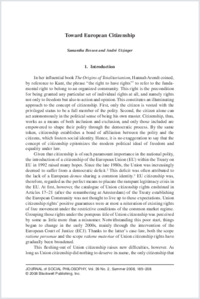Towards European Citizenship
- Besson, Samantha Université de Fribourg
- Utzinger, André Université de Fribourg
-
2008
Published in:
- Journal of Social Philosophy. - 2008, vol. 39, no. 2, p. 185-208
English
In her influential book The Origins of Totalitarianism, Hannah Arendt coined,by reference to Kant, the phrase “the right to have rights”1 to refer to the fundamental right to belong to an organized community. This right is the precondition for being granted any particular set of individual rights at all, and namely rights not only to freedom but also to action and opinion. This constitutes an illuminating approach to the concept of citizenship. First, only the citizen is vested with the privileged status to be a full member of the polity. Second, the citizen alone can act autonomously in the political sense of being his own master. Citizenship, thus,works as a means of both inclusion and exclusion, and only those included are empowered to shape their polity through the democratic process. By the same token, citizenship establishes a bond of affiliation between the polity and the citizens, which fosters social identity. Hence, it is no exaggeration to say that the concept of citizenship epitomizes the modern political ideal of freedom and equality under law. Given that citizenship is of such paramount importance in the national polity, the introduction of a citizenship of the European Union (EU) within the Treaty on EU in 1992 raised many hopes. Since the late 1980s, the Union was increasingly deemed to suffer from a democratic deficit.2 This deficit was often attributed to the lack of a European demos sharing a common identity.3 EU citizenship was, therefore, regarded as the perfect means to placate the rampant legitimacy crisis in the EU. At first, however, the catalogue of Union citizenship rights enshrined in Articles 17–21 (after the renumbering at Amsterdam) of the Treaty establishing the European Community was not thought to live up to these expectations. Union citizenship rights’ positive guarantees were at most a reiteration of existing rights of free movement under the restrictive conditions of the common market regime. Grouping those rights under the pompous title of Union citizenship was perceived by some as little more than a misnomer. Notwithstanding this poor start, things began to change in the early 2000s, mainly through the intervention of the European Court of Justice (ECJ). Thanks to the latter’s case-law, both the scope ratione personae and the scope ratione materiae of Union citizenship rights have gradually been broadened.
- Faculty
- Faculté de droit
- Department
- Département de droit international et droit commercial
- Language
-
- English
- Classification
- Law, jurisprudence
- License
-
License undefined
- Identifiers
-
- RERO DOC 28131
- DOI 10.1111/j.1467-9833.2008.00421.x
- Persistent URL
- https://folia.unifr.ch/unifr/documents/302236
Statistics
Document views: 186
File downloads:
- Texte intégral: 312
